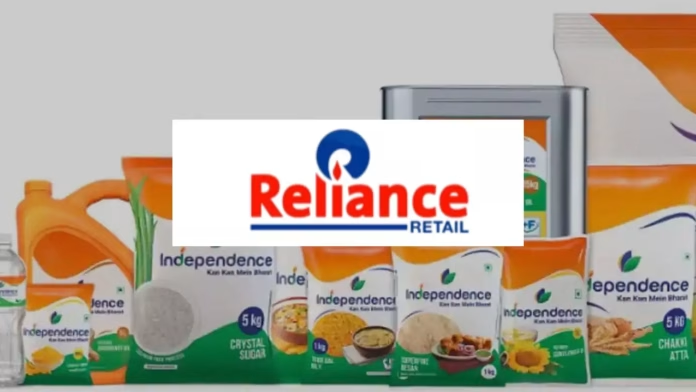Reliance, led by Mukesh Ambani, has intensified its efforts to expand its presence in the highly competitive FMCG sector, which has long been dominated by established players such as ITC and Hindustan Unilever. In pursuit of a larger market share, Reliance has now extended the reach of its consumer packaged goods brand ‘Independence’ to North India, demonstrating its commitment to the Indian market.
Reliance Consumer Products, a subsidiary of Reliance Retail Ventures Limited (RRVL), has unveiled its plans to extend the reach of its brand across the densely-populated regions of Punjab, Haryana, Delhi-NCR, Uttar Pradesh, Uttarakhand, and Bihar. The brand offers a wide range of fast-moving consumer goods (FMCG) including everyday essentials, staples, processed foods, and more.
Reliance Retail’s FMCG division initially introduced the brand in Gujarat back in December of the previous year.
The company stated its commitment to offering Indian consumers locally crafted, high-quality products at competitive prices.
Reliance highlighted the substantial demand within a large segment of the Indian population for a reliable consumer goods brand that provides a diverse range of premium products at affordable prices.
Moreover, RCPL is engaging in partnerships with trade partners, such as manufacturers and kirana stores, with the aim of offering them enhanced business prospects, according to their statement.
In the coming months, the company also intends to expand its distribution network by leveraging both online and offline channels, aiming to reach a wider consumer base throughout the country.
During Reliance’s 45th annual general meeting in August of the previous year, Chairman Mukesh Ambani made the announcement of the company’s foray into the FMCG market, positioning itself as a direct competitor to established brands such as Unilever and ITC.
Reliance has taken significant steps to gain a foothold in the FMCG market of the world’s most populous country. This includes strategic acquisitions of brands like Lotus Chocolate, as well as forging partnerships and implementing various other measures.
Read More: RCPL expands its FMCG portfolio with successful acquisition of Lotus Chocolate Company
Last month, Reliance Consumer Products forged a partnership with General Mills to venture into the western snacks category. This collaboration enables Reliance to introduce the globally recognized corn chips brand, Alan’s Bugles, owned by General Mills, in the Indian market. This move positions Reliance in direct competition with established brands such as PepsiCo’s Lays, ITC’s Bingo, Balaji Wafers, as well as the vast unorganized snacks market.
Reliance’s FMCG portfolio has witnessed several notable additions in recent times. Among them are Campa, Sosyo, and Raskik beverages, which offer refreshing drink options. Additionally, Independence has introduced a range of daily essentials, while the confectionery brand Toffeeman has delighted consumers with its delicious treats. Maliban biscuits have also become a part of Reliance’s product lineup, satisfying cravings for baked goods. Moreover, the home and personal care brand Glimmer and Dozo have been introduced to enhance the company’s offerings in the household and personal care sectors.
As part of its strategy, the company aims to compete with established brands in various categories by implementing a playbook that involves price adjustments for entry-level packs. This approach allows Reliance to offer competitive pricing options to consumers while challenging the dominance of established players in the market.
As the market competition intensifies, it is anticipated that existing players may experience lower valuations. This situation has the potential to benefit consumers, particularly those at the lower end of the market. With lower valuations, companies may be compelled to offer more competitive prices, thus creating greater affordability and value for consumers in that segment.
Nevertheless, conventional FMCG companies are actively strengthening their business frameworks and diversifying their range of products in anticipation of heightened rivalry.
Numerous prominent entities have procured regional brands or enterprises and allocated resources towards direct-to-consumer (D2C) digital brands in order to augment their current offerings. Additionally, companies are actively investing in fortifying their brands to establish a comprehensive omni-channel presence, thereby accommodating a broader spectrum of consumer preferences and shopping behaviors.





